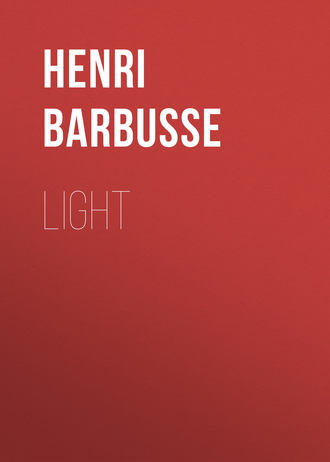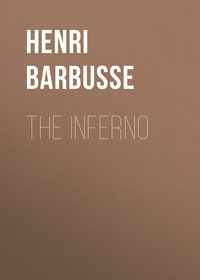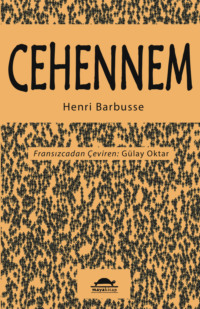 полная версия
полная версияLight
For a moment I stood bewildered by this want of understanding; this difference between her way of feeling and mine. It was a disagreeable revelation of the unknown. One might often, in regard to small matters, make a multitude of reflections if one wished; but one does not wish.
* * * * * *My position at the factory and in our quarter is becoming gradually stronger. By reason of a regular gratuity which I received, we are at last able to put money aside each month, like everybody.
"I say!" cried Crillon, pulling me outside with him, as I was coming in one evening; "I must let you know that you've been spoken of spontanially for the Town Council at the next renewment. They're making a big effort, you know. Monsieur the Marquis is going to stand for the legislative elections—but we've walked into the other quarter," said Crillon, stopping dead. "Come back, come back."
We turned right-about-face.
"This patriotic society of Monsieur Joseph," Crillon went on, "has done a lot of harm to the anarchists. We've all got to let 'em feel our elbows, that's necessential. You've got a foot in the factory, eh? You see the workmen; have a crack of talk with 'em. You ingreasiate yourself with 'em, so's some of 'em'll vote for you. For them's the danger."
"It's true that I am very sympathetic to them," I murmured, impressed by this prospect.
Crillon came to a stand in front of the Public Baths. "It's the seventeenth to-day," he explained; "the day of the month when I takes a bath. Oh, yes! I know that you go every Thursday; but I'm not of that mind. You're young, of course, and p'raps you have good reason! But you take my tip, and hobnob with the working man. We must bestir ourselves and impell ourselves, what the devil! As for me, I've finished my political efforts for peace and order. It's your turn!"
He is right. Looking at the ageing man, I note that his framework is slightly bowed; that his ill-shaven cheeks are humpbacked with little ends of hair turning into white crystals. In his lowly sphere he has done his duty. I reflect upon the mite-like efforts of the unimportant people; of the mountains of tasks performed by anonymity. They are necessary, these hosts of people so closely resembling each other; for cities are built upon the poor brotherhood of paving-stones.
He is right, as always. I, who am still young; I, who am on a higher level than his; I must play a part, and subdue the desire one has to let things go on as they may.
A sudden movement of will appears in my life, which otherwise proceeds as usual.
CHAPTER VI
A VOICE IN THE EVENING
I approached the workpeople with all possible sympathy. The toiler's lot, moreover, raises interesting problems, which one should seek to understand. So I inform myself in the matter of those around me.
"You want to see the greasers' work? Here I am," said Marcassin, surnamed Pétrolus. "I'm the lamp-man. Before that I was a greaser. Is that any better? Can't say. It's here that that goes on, look—there. My place you'll find at night by letting your nose guide you."
The truth is that the corner of the factory to which he leads me has an aggressive smell. The shapeless walls of this sort of grotto are adorned with shelves full of leaking lamps—lamps dirty as beasts. In a bucket there are old wicks and other departed things. At the foot of a wooden cupboard which looks like iron are lamp glasses in paper shirts; and farther away, groups of oil-drums. All is dilapidated and ruinous; all is dark in this angle of the great building where light is elaborated. The specter of a huge window stands yonder. The panes only half appear; so encrusted are they they might be covered with yellow paper. The great stones—the rocks—of the walls are upholstered with a dark deposit of grease, like the bottom of a stewpan, and nests of dust hang from them. Black puddles gleam on the floor, with beds of slime from the scraping of the lamps.
There he lives and moves, in his armored tunic encrusted with filth as dark as coffee-grounds. In his poor claw he grips the chief implement of his work—a black rag. His grimy hands shine with paraffin, and the oil, sunk and blackened in his nails, gives them a look of wick ends. All day long he cleans lamps, and repairs, and unscrews, and fills, and wipes them. The dirt and the darkness of this population of appliances he attracts to himself, and he works like a nigger.
"For it's got to be well done," he says, "and even when you're fagged out, you must keep on rubbing hard."
"There's six hundred and sixty-three, monsieur" (he says "monsieur" as soon as he embarks on technical explanations), "counting the smart ones in the fine offices, and the lanterns in the wood-yard, and the night watchmen. You'll say to me, 'Why don't they have electricity that lights itself?' It's 'cos that costs money and they get paraffin for next to nothing, it seems, through a big firm 'at they're in with up yonder. As for me, I'm always on my legs, from the morning when I'm tired through sleeping badly, from after dinner when you feel sick with eating, up to the evening, when you're sick of everything."
The bell has rung, and we go away in company. He has pulled off his blue trousers and tunic and thrown them into a corner—two objects which have grown heavy and rusty, like tools. But the dirty shell of his toil did upholster him a little, and he emerges from it gaunter, and horribly squeezed within the littleness of a torturing jacket. His bony legs, in trousers too wide and too short, break off at the bottom in long and mournful shoes, with hillocks, and resembling crocodiles; and their soles, being soaked in paraffin, leave oily footprints, rainbow-hued, in the plastic mud.
Perhaps it is because of this dismal companion towards whom I turn my head, and whom I see trotting slowly and painfully at my side in the rumbling grayness of the evening exodus, that I have a sudden and tragic vision of the people, as in a flash's passing. (I do sometimes get glimpses of the things of life momentarily.) The dark doorway to my vision seems torn asunder. Between these two phantoms in front the sable swarm outspreads. The multitude encumbers the plain that bristles with dark chimneys and cranes, with ladders of iron planted black and vertical in nakedness—a plain vaguely scribbled with geometrical lines, rails and cinder paths—a plain utilized yet barren. In some places about the approaches to the factory cartloads of clinker and cinders have been dumped, and some of it continues to burn like pyres, throwing off dark flames and darker curtains. Higher, the hazy clouds vomited by the tall chimneys come together in broad mountains whose foundations brush the ground and cover the land with a stormy sky. In the depths of these clouds humanity is let loose. The immense expanse of men moves and shouts and rolls in the same course all through the suburb. An inexhaustible echo of cries surrounds us; it is like hell in eruption and begirt by bronze horizons.
At that moment I am afraid of the multitude. It brings something limitless into being, something which surpasses and threatens us; and it seems to me that he who is not with it will one day be trodden underfoot.
My head goes down in thought. I walk close to Marcassin, who gives me the impression of an escaping animal, hopping through the darkness—whether because of his name,2 or his stench, I do not know. The evening is darkening; the wind is tearing leaves away; it thickens with rain and begins to nip.
My miserable companion's voice comes to me in shreds. He is trying to explain to me the law of unremitting toil. An echo of his murmur reaches my face.
"And that's what one hasn't the least idea of. Because what's nearest to us, often, one doesn't see it."
"Yes, that's true," I say, rather weary of his monotonous complaining.
I try a few words of consolation, knowing that he was recently married. "After all, no one comes bothering you in your own little corner. There's always that. And then, after all, you're going home—your wife is waiting for you. You're lucky–"
"I've no time; or rather, I've no strength. At nights, when I come home I'm too tired—I'm too tired, you understand, to be happy, you see. Every morning I think I shall be, and I'm hoping up till noon; but at night I'm too knocked out, what with walking and rubbing for eleven hours; and on Sundays I'm done in altogether with the week. There's even times that I don't even wash myself when I come in. I just stay with my hands mucky; and on Sundays when I'm cleaned up, it's a nasty one when they say to me, 'You're looking well.'"
And while I am listening to the tragicomical recital which he retails, like a soliloquy, without expecting replies from me—luckily, for I should not know how to answer—I can, in fact, recall those holidays when the face of Pétrolus is embellished by the visible marks of water.
"Apart from that," he goes on, withdrawing his chin into the gray string of his over-large collar; "apart from that, Charlotte, she's very good. She looks after me, and tidies the house, and it's her that lights our lamp; and she hides the books carefully away from me so's I can't grease 'em, and my fingers make prints on 'em like criminals. She's good, but it doesn't turn out well, same as I've told you, and when one's unhappy everything's favorable to being unhappy."
He is silent for a while, and then adds by way of conclusion to all he has said, and to all that one can say, "My father, he caved in at fifty. And I shall cave in at fifty, p'raps before."
With his thumb he points through the twilight at that sort of indelible darkness which makes the multitude, "Them others, it's not the same with them. There's those that want to change everything and keep going on that notion. There's those that drink and want to drink, and keep going that way."
I hardly listen to him while he explains to me the grievances of the different groups of workmen, "The molders, monsieur, them, it's a matter of the gangs–"
Just now, while looking at the population of the factory, I was almost afraid; it seemed to me that these toilers were different sorts of beings from the detached and impecunious people who live around me. When I look at this one I say to myself, "They are the same; they are all alike."
In the distance, and together, they strike fear, and their combination is a menace; but near by they are only the same as this one. One must not look at them in the distance.
Pétrolus gets excited; he makes gestures; he punches in and punches out again with his fist, the hat which is stuck askew on his conical head, over the ears that are pointed like artichoke leaves. He is in front of me, and each of his soles is pierced by a valve which draws in water from the saturated ground.
"The unions, monsieur–" he cries to me in the wind, "why, it's dangerous to point at them. You haven't the right to think any more—that's what they call liberty. If you're in them, you've got to be agin the parsons—(I'm willing, but what's that got to do with labor?)—and there's something more serious," the lamp-man adds, in a suddenly changed voice, "you've got to be agin the army,—the army!"
And now the poor slave of the lamp seems to take a resolution. He stops and devotionally rolling his Don Quixote eyes in his gloomy, emaciated face, he says, "I'm always thinking about something. What? you'll say. Well, here it is. I belong to the League of Patriots."
As they brighten still more, his eyes are like two live embers in the darkness, "Déroulède!" he cries; "that's the man—he's my God!"
Pétrolus raises his voice and gesticulates; he makes great movements in the night at the vision of his idol, to whom his leanness and his long elastic arms give him some resemblance. "He's for war; he's for Alsace-Lorraine, that's what he's for; and above all, he's for nothing else. Ah, that's all there is to it! The Boches have got to disappear off the earth, else it'll be us. Ah, when they talk politics to me, I ask 'em, 'Are you for Déroulède, yes or no?' That's enough! I got my schooling any old how, and I know next to nothing but I reckon it's grand, only to think like that, and in the Reserves I'm adjutant3—almost an officer, monsieur, just a lamp-man as I am!"
He tells me, almost in shouts and signs, because of the wind across the open, that his worship dates from a function at which Paul Déroulède had spoken to him. "He spoke to everybody, an' then he spoke to me, as close to me as you and me; but it was him! I wanted an idea, and he gave it to me!"
"Very good," I say to him; "very good. You are a patriot, that's excellent."
I feel that the greatness of this creed surpasses the selfish demands of labor—although I have never had the time to think much about these things—and it strikes me as touching and noble.
A last fiery spasm gets hold of Pétrolus as he espies afar Eudo's pointed house, and he cries that on the great day of revenge there will be some accounts to settle; and then the fervor of this ideal-bearer cools and fades, and is spent along the length of the roads. He is now no more than a poor black bantam which cannot possibly take wing. His face mournfully awakes to the evening. He shuffles along, bows his long and feeble spine, and his spirit and his strength exhausted, he approaches the porch of his house, where Madame Marcassin awaits him.
CHAPTER VII
A SUMMARY
The workmen manifest mistrust and even dislike towards me. Why? I don't know; but my good intentions have gradually got weary.
One after another, sundry women have occupied my life. Antonia Véron was first. Her marriage and mine, their hindrance and restriction, threw us back upon each other as of yore. We found ourselves alone one day in my house—where nothing ever used to happen, and she offered me her lips, irresistibly. The appeal of her sensuality was answered by mine, then, and often later. But the pleasure constantly restored, which impelled me towards her, always ended in dismal enlightenments. She remained a capricious and baffling egotist, and when I came away from her house across the dark suburb among a host of beings vanishing, like myself, I only brought away the memory of her nervous and irritating laugh, and that new wrinkle which clung to her mouth like an implement.
Then younger desires destroyed the old, and gallant adventures begot one another. It is all over with this one and that one whom I adored. When I see them again, I wonder that I can say, at one and the same time, of a being who has not changed, "How I loved her!" and, "How I have ceased to love her!"
All the while performing as a duty my daily task, all the while taking suitable precautions so that Marie may not know and may not suffer, I am looking for the happiness which lives. And truly, when I have a sense of some new assent wavering and making ready, or when I am on the way to a first rendezvous, I feel myself gloriously uplifted, and equal to everything!
This fills my life. Desire wears the brain as much as thought wears it. All my being is agog for chances to shine and to be shared. When they say in my presence of some young woman that, "she is not happy," a thrill of joy tears through me.
On Sundays, among the crowds, I have often felt my heart tighten with distress as I watch the unknown women. Reverie has often held me all day because of one who has gone by and disappeared, leaving me a clear vision of her curtained room, and of herself, vibrating like a harp. She, perhaps, was the one I should have always loved; she whom I seek gropingly, desperately, from each to the next. Ah, what a delightful thing to see and to think of a distant woman always is, whoever she may be!
There are moments when I suffer, and am to be pitied. Assuredly, if one could read me really, no one would pity me. And yet all men are like me. If they are gifted with acceptable physique they dream of headlong adventures, they attempt them, and our heart never stands still. But no one acknowledges that, no one, ever.
Then, there were the women who turned me a cold shoulder; and among them all Madame Pierron, a beautiful and genteel woman of twenty-five years, with her black fillets and her marble profile, who still retained the obvious awkwardness and vacant eye of young married women. Tranquil, staid and silent, she came and went and lived, totally blind to my looks of admiration.
This perfect unconcern aggravated my passion. I remember my pangs one morning in June, when I saw some feminine linen spread upon the green hedge within her garden. The delicate white things marshaled there were waiting, stirred by the leaves and the breeze; so that Spring lent them frail shape and sweetness—and life. I remember, too, a gaunt house, scorching in the sun, and a window which flashed and then shut! The window stayed shut, like a slab. All the world was silent; and that splendid living being was walled up there. And last, I have recollection of an evening when, in the bluish and dark green and chalky landscape of the town and its rounded gardens, I saw that window lighted up. A narrow glimmer of rose and gold was enframed there, and I could distinguish, leaning on the sill that overhung the town, in the heart of that resplendence, a feminine form which stirred before my eyes in inaccessible forbearance. Long did I watch with shaking knees that window dawning upon space, as the shepherd watches the rising of Venus. That evening, when I had come in and was alone for a moment—Marie was busy below in the kitchen—alone in our unattractive room, I retired to the starry window, beset by immense thoughts. These spaces, these separations, these incalculable durations—they all reduce us to dust, they all have a sort of fearful splendor from which we seek defense in our hiding.
* * * * * *I have not retained a definite recollection of a period of jealousy from which I suffered for a year. From certain facts, certain profound changes of mood in Marie, it seemed to me that there was some one between her and me. But beyond vague symptoms and these terrible reflections on her, I never knew anything. The truth, everywhere around me, was only a phantom of truth. I experienced acute internal wounds of humiliation and shame, of rebellion! I struggled feebly, as well as I could, against a mystery too great for me, and then my suspicions wore themselves out. I fled from the nightmare, and by a strong effort I forgot it. Perhaps my imputations had no basis; but it is curious how one ends in only believing what one wants to believe.
* * * * * *Something which had been plotting a long while among the Socialist extremists suddenly produced a stoppage of work at the factory, and this was followed by demonstrations which rolled through the terrified town. Everywhere the shutters went up. The business people blotted out their shops, and the town looked like a tragic Sunday.
"It's a revolution!" said Marie to me, turning pale, as Benoît cried to us from the step of our porch the news that the workmen were marching. "How does it come about that you knew nothing at the factory?"
An hour later we learned that a delegation composed of the most dangerous ringleaders was preceding the army of demonstrators, commissioned to extort outrageous advantages, with threats, from Messrs. Gozlan.
Our quarter had a loose and dejected look. People went furtively, seeking news, and doors half opened regretfully. Here and there groups formed and lamented in undertones the public authority's lack of foresight, the insufficient measures for preserving order.
Rumors were peddled about on the progress of the demonstration.
"They're crossing the river."
"They're at the Calvary cross-roads."
"It's a march against the castle!"
I went into Fontan's. He was not there, and some men were talking in the twilight of the closed shutters.
"The Baroness is in a dreadful way. She's seen a dark mass in the distance. Some young men of the aristocracy have armed themselves and are guarding her. She says it's another Jacquerie4 rising!"
"Ah, my God! What a mess!" said Crillon.
"It's the beginning of the end!" asserted old Daddy Ponce, shaking his grayish-yellow forehead, all plaited with wrinkles.
Time went by—still no news. What are they doing yonder? What shall we hear next?
At last, towards three o'clock Postaire is framed in the doorway, sweating and exultant. "It's over! It's all right, my lad!" he gasps; "I can vouch for it that they all arrived together at the Gozlans' villa. Messrs. Gozlan were there. The delegates, I can vouch for it that they started shouting and threatening, my lad! 'Never mind that!' says one of the Messrs. Gozlan, 'let's have a drink first; I'll vouch for it we'll talk better after!' There was a table and champagne, I'll vouch for it. They gave 'em it to drink, and then some more and then some more. I'll vouch for it they sent themselves something down, my lad, into their waistcoats. I can vouch for it that the bottles of champagne came like magic out of the ground. Fontan kept always bringing them as though he was coining them. Got to admit it was an extra-double-special guaranteed champagne, that you want to go cautious with. So then, after three-quarters of an hour, nearly all the deputation were drunk. They spun round, tongue-tied, and embraced each other,—I can vouch for it. There were some that stuck it, but they didn't count, my lad! The others didn't even know what they'd come for. And the bosses; they'd had a fright, and they didn't half wriggle and roar with laughing—I'll vouch for it, my lad! An' then, to-morrow, if they want to start again, there'll be troops here!"
Joyful astonishment—the strike had been drowned in wine! And we repeated to each other, "To-morrow there'll be the military!"
"Ah!" gaped Crillon, rolling wonder-struck eyes, "That's clever! Good; that's clever, that is! Good, old chap–"
He laughed a heavy, vengeful laugh, and repeated his familiar refrain full-throated: "The sovereign people that can't stand on its own legs!"
By the side of a few faint-hearted citizens who had already, since the morning, modified their political opinions, a great figure rises before my eyes—Fontan. I remember that night, already long ago, when a chance glimpse through the vent-hole of his cellar showed me shiploads of bottles of champagne heaped together, and pointed like shells. For some future day he foresaw to-day's victory. He is really clever, he sees clearly and he sees far. He has rescued law and order by a sort of genius.
The constraint which has weighed all day on our gestures and words explodes in delight. Noisily we cast off that demeanor of conspirators which has bent our shoulders since morning. The windows that were closed during the weighty hours of the insurrection are opened wide; the houses breathe again.
"We're saved from that gang!" people say, when they approach each other.
This feeling of deliverance pervades the most lowly. On the step of the little blood-red restaurant I spy Monsieur Mielvaque, hopping for joy. He is shivering, too, in his thin gray coat, cracked with wrinkles, that looks like wrapping paper; and one would say that his dwindled face had at long last caught the hue of the folios he desperately copies among his long days and his short nights, to pick up some sprigs of extra pay. There he stands, not daring to enter the restaurant (for a reason he knows too well); but how delighted he is with the day's triumph for society! And Mademoiselle Constantine, the dressmaker, incurably poor and worn away by her sewing-machine, is overjoyed. She opens wide the eyes which seem eternally full of tears, and in the grayish abiding half-mourning of imperfect cleanliness, in pallid excitement, she claps her hands.
Marie and I can hear the furious desperate hammering of Brisbille in his forge, and we begin to laugh as we have not laughed for a long time.
At night, before going to sleep, I recall my former democratic fancies. Thank God, I have escaped from a great peril! I can see it clearly by the terror which the workmen's menace spread in decent circles, and by the universal joy which greeted their recoil! My deepest tendencies take hold of me again for good, and everything settles down as before.
* * * * * *Much time has gone by. It is ten years now since I was married, and in that lapse of time there is hardly a happening that I remember, unless it be the disillusion of the death of Marie's rich godmother, who left us nothing. There was the failure of the Pocard scheme, which was only a swindle and ruined many small people. Politics pervaded the scandal, while certain people hurried with their money to Monsieur Boulaque, whose scheme was much more safe and substantial. There was also my father-in-law's illness and his death, which was a great shock to Marie, and put us into black clothes.







